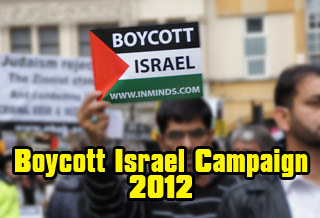|
[Boycott - Arms] In Tense Times, Israeli Arms Biz Booms
Neal Sandler, BusinessWeek
17 May 2007 Growing demand for cutting-edge unmanned airplanes and military electronics equipment are contributing to record revenues

Israel is the world's fourth-largest arms supplier after the U.S, Russia, and France. Military exports from the small Mideast nation rose 20% last year, to $4.2 billion, and Israeli arms suppliers signed a record $5 billion in new contracts in 2006. 
In an era of geopolitical tensions, worldwide defense budgets last year reached a staggering new threshold of $1.1 trillion—nearly half of that from the U.S. Lining up for its share of the business is Israel, the world's fourth-largest arms supplier after the U.S, Russia, and France. Military exports from the small Mideast nation rose 20% last year, to $4.2 billion, and Israeli arms suppliers signed a record $5 billion in new contracts in 2006.
Israel's defense industry is benefiting from demand for its unmanned aerial vehicles (UAVs) and sophisticated electronic warfare equipment of the sort used in the ongoing Palestinian conflict and during last summer's war in Lebanon. "We're looking for defense exports to grow by a 20% annual clip at least through 2010," predicts Joshua Yeres, defense analyst at Giza Singer Even, an investment and consulting firm in Ramat Gan, near Tel Aviv.
India Overtakes U.S. as Top Customer
The arms industry gets about two-thirds of its business abroad, with sales to the Israel Defense Forces (IDF) accounting for the remainder. Some 90% of all export sales are accounted for by just four giants: publicly traded Elbit Systems (ESLT) and three state-owned companies, Israel Aerospace Industries (IAI), RAFAEL Armament Development Authority, and Israel Military Industries (IMI).
The government doesn't reveal sales by country, but other sources suggest some intriguing trends. For decades, Israel's top arms customer was the U.S. But earlier this year, the Indian government released figures showing that in 2006 it bought $1.5 billion in weapons from Israel. That made New Delhi Israel's largest customer for the year, ahead of the No. 2 U.S.
Among the deals: In November India is scheduled to take delivery of the first of three AWACS-type aerial reconnaissance planes, called Phalcons, that it ordered from IAI in a $1.1 billion deal. India has also purchased a Barak antimissile defense system, UAVs, and Israel's Green Pine missile-detection and tracking radar.
Backing Off on Chinese Deals
Other major buyers of Israeli weapons and arms include Turkey, Singapore, Spain, Romania, and Poland. But sales to China, once a major customer, have been a source of tension between Jerusalem and Washington. In 2000 Israel was forced to cancel a lucrative sale of Airborne Warning and Control System (AWACS) planes because of Pentagon objections and had to pay $350 million in damages to Beijing for terminating the deal.
More recently, Israel reshuffled senior Defense Ministry officials and agreed to tighten arms export regulations after the Pentagon complained about maintenance work on UAVs that Israel sold the Chinese a decade earlier. Sales to China have now resumed, though at lower levels than in the past. Precise figures aren't available.
Demand elsewhere has more than offset the decline of the Chinese market. "We're witnessing an unprecedented rise in demand for advanced military electronics, and Israel is a recognized leader in this field," says Joseph Ackerman, chief executive officer of Elbit, the country's largest private sector defense company. That has paid off handsomely for Elbit. In 2005 the company won a landmark £700 million ($1.4 billion) joint-venture deal with Thales UK to supply Britain with its Hermes UAV.
Robust Growth for Top Suppliers
The growing global demand for its UAVs and sophisticated "command and control" computer intelligence equipment led to a doubling in 2006 of Elbit's net income, to $72.2 million, on revenues of $1.45 billion, up 42%. Earlier this month, investment bank UBS (UBS) predicted company revenues would reach $1.9 billion in 2007 with continued improvement in its bottom line. The company's stock price has nearly doubled in the past year.
Israel's largest defense company, IAI, also has seen a big upswing. Defense industry experts attribute the results to its new CEO, Yitzhak Nissan, who took over in February, 2006. He has instituted a sharp cost-cutting campaign and boosted marketing. The company, which for years was only marginally profitable, reported a record $115 million net profit on sales of $2 billion in the first nine months of 2006—and booked more than $4 billion in new contracts.
The upturn is due in large part to demand for IAI's larger UAV, called the Heron, which has been a big hit with the U.S. and India, and has been used in the Iraq war. It has also gained business from missiles, sophisticated electronic warfare equipment, and upgrade work on existing military planes owned by clients around the world. Earlier this month Northrop Grumman (NOC) announced that it was teaming up with IAI to build and launch small reconnaissance satellites based on the Israeli company's technology. The estimated cost of each satellite is put at $200 million. "This has huge potential for us in the American and other markets," says a senior IAI official.
Another state-owned company, Rafael Armament Development Authority, also has seen a sharp increase in business. The once top-secret weapons development agency was converted into a standalone company several years ago to let it compete better in world markets. The developer of air, naval, and land-based rocket and weapons systems reported a net profit of $26 million on sales of just over $1 billion.
IMI Loses Out with Small Arms
The only Israeli company that has not joined in the boom is IMI, a maker of mostly small arms, including the Uzi submachine gun, grenades, and artillery and mortar ammunition. According to government sources, the company had 2006 sales of around $410 million, much of it in exports, but it is in such deep financial trouble that it hasn't issued financial statements in two years. The problem? Many countries are now producing their own ammunition, making it far more difficult for companies like IMI to survive.
Last year the Israeli government decided to sell IMI in an attempt to keep it afloat, but so far the privatization process has met with little success. To rescue IMI, former senior defense industry official Avner Raz was appointed to be the company's new CEO on May 16.
Increased demand from the Israeli Defense Forces following last summer's war in Lebanon is expected to help IMI out somewhat. But unless the financially strapped company transforms itself into a high-tech player like the other local defense giants, its chances of benefiting from the current export boom seem slim.
Source: http://www.businessweek.com/globalbiz/content/may2007/gb20070517_462283.htm 
Also Of Interest
Page URL: http://inminds.com/article.php?id=10144
|





















































